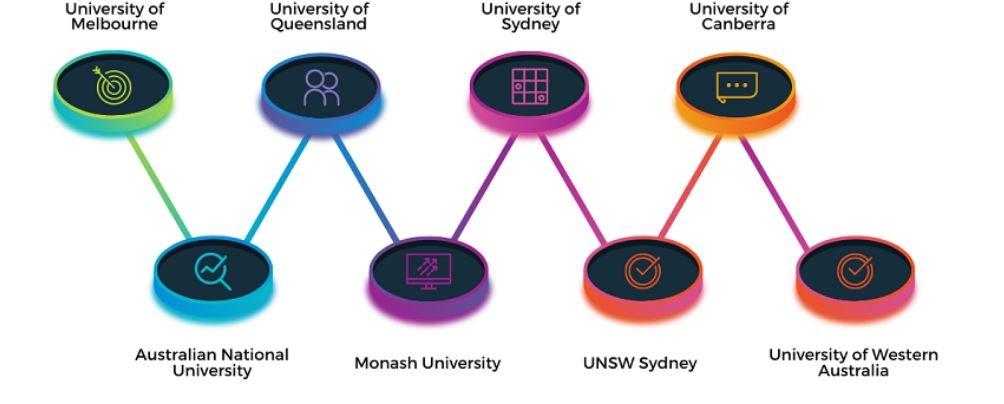Why Study in Australia?
![]()
Studying in Australia as a Pakistani student offers a range of benefits, making it an attractive destination for international education. Here are several reasons why you might consider studying in Australia:
High-Quality Education:Australian universities consistently rank high globally, and the education system is known for its quality and academic excellence. Many institutions in Australia maintain rigorous academic standards and offer a diverse range of programs.
Diverse Range of Courses:Australia provides a wide array of courses and programs across various disciplines. Whether you’re interested in business, engineering, sciences, arts, or other fields, you can find a program that suits your academic and career goals.
Innovative Research Opportunities:Australia is a hub for cutting-edge research, and many universities actively engage in innovative research projects. As a student, you may have opportunities to contribute to and benefit from ongoing research initiatives.
Work Opportunities:Australia allows international students to work part-time during their studies and full-time during scheduled breaks. This can help you gain valuable work experience, offset living expenses, and enhance your employability after graduation.
Post-Study Work Opportunities:The Post-Study Work Visa (PSWV) allows international students who have completed their degrees in Australia to work in the country for a specified period after graduation. This provides an opportunity to gain practical work experience and potentially qualify for permanent residency.
Quality of Life:Australia is known for its high quality of life, vibrant cities, and diverse cultural experiences. The country is recognized for its safety, healthcare system, and overall well-being.
Multicultural Environment:Australia is a multicultural society that embraces diversity. Studying in Australia allows you to interact with people from various cultural backgrounds, fostering a rich and inclusive learning environment.
English Language Environment:Studying in an English-speaking country like Australia provides an immersive language experience, improving your English language proficiency, which is valuable for future career opportunities.
Global Recognition of Degrees:Australian degrees are globally recognized and respected. Graduates from Australian institutions are well-regarded by employers around the world.
Beautiful Natural Environment:Australia is known for its stunning landscapes, from beautiful beaches to iconic landmarks. The country’s diverse ecosystems offer unique experiences for students interested in outdoor activities and exploration.
Before deciding to study in Australia, it’s important to research specific universities, programs, and visa requirements. Additionally, consider the cost of living, accommodation options, and the overall cultural and lifestyle aspects to ensure it aligns with your preferences and goals.
Best Course for Study in Australia
![]()

The best course for study in Australia for a Pakistani student depends on your academic interests, career goals, and personal preferences. Australia offers a diverse range of courses across various disciplines. Here are some popular fields of study that Pakistani students often consider:
Engineering and Technology:Australia is known for its strong engineering programs, including civil engineering, mechanical engineering, electrical engineering, and computer science. Courses often incorporate practical elements and opportunities for internships.
Information Technology and Computer Science:Australia is at the forefront of technology, and IT and computer science programs are highly regarded. Specializations may include software engineering, data science, cybersecurity, and artificial intelligence.
Business and Management:Business and management courses are popular choices, offering specializations in areas such as finance, marketing, entrepreneurship, and international business. Australian business schools often have strong ties to industry.
Health Sciences:Australia has reputable medical and health science programs. Options include medicine, nursing, physiotherapy, pharmacy, and public health. Graduates from Australian health programs are recognized internationally.
Natural Sciences:Courses in natural sciences, including biology, chemistry, physics, and environmental science, are available. Australia’s diverse ecosystems and research opportunities make it an attractive destination for science enthusiasts.
Social Sciences:Social sciences programs cover areas such as psychology, sociology, anthropology, and international relations. These courses provide insights into human behavior, societies, and global issues.
Education:Education programs are popular for students interested in becoming teachers or educators. Specializations may include primary education, secondary education, special education, or early childhood education.
Creative Arts and Design:Australia has a vibrant arts and design scene. Courses in fine arts, graphic design, film and television, and performing arts offer opportunities for creative expression and skill development.
Tourism and Hospitality:With its scenic landscapes and tourism industry, Australia offers programs in tourism and hospitality management. Students can learn about tourism trends, event management, and hotel operations.
Environmental Science and Sustainability:Given Australia’s focus on environmental conservation, programs in environmental science and sustainability are popular. Students can explore issues related to climate change, conservation, and environmental policy.
When choosing a course, consider factors such as your academic background, career aspirations, and personal interests. Research universities offering programs in your chosen field and review their curriculum, faculty expertise, and industry connections. Additionally, consider the location of the university, the cost of living, and potential post-study work opportunities. It’s advisable to consult with educational counselors, university representatives, and professionals in your field of interest for guidance.
What are the Universities in Australia?
![]()

Australia is home to several prestigious universities offering a wide range of academic programs. Here are some of the prominent universities in Australia:
University of Melbourne (Melbourne):Known for its strong emphasis on research, the University of Melbourne consistently ranks as one of the top universities globally. It offers a diverse range of undergraduate and postgraduate programs.
Australian National University (ANU) (Canberra):ANU is known for its research-intensive programs and strong emphasis on social sciences, humanities, and sciences. It’s the national university of Australia and has a reputation for academic excellence.
University of Sydney (Sydney):The University of Sydney is one of Australia’s oldest and most prestigious institutions. It offers a comprehensive range of programs across various disciplines and is known for its vibrant campus life.
University of Queensland (Brisbane):The University of Queensland is renowned for its research output and offers a diverse range of programs, particularly in science, engineering, and business. It has a strong international reputation.
University of New South Wales (UNSW Sydney):UNSW is known for its strong emphasis on innovation and entrepreneurship. It offers programs in engineering, business, arts, and social sciences.
University of Western Australia (Perth):The University of Western Australia is known for its research contributions, particularly in science and engineering. It offers a range of undergraduate and postgraduate programs.
Monash University (Melbourne):Monash University is the largest university in Australia, known for its strong emphasis on research and a wide range of programs, including business, medicine, and engineering.
University of Adelaide (Adelaide):The University of Adelaide is recognized for its research-intensive programs and strengths in areas such as agriculture, sciences, and engineering.
University of Technology Sydney (UTS) (Sydney):UTS is known for its focus on practical, industry-relevant education. It has strengths in areas such as engineering, information technology, and business.
Queensland University of Technology (QUT) (Brisbane):QUT is recognized for its innovative and practical programs. It has strengths in areas such as creative industries, business, and technology.
University of South Australia (UniSA) (Adelaide):UniSA is known for its strong emphasis on applied research and offers a range of programs in business, health sciences, and engineering.
Griffith University (Brisbane and Gold Coast):Griffith University is known for its inclusive and diverse community. It offers programs in areas such as health, business, and arts.
These universities are just a selection of the many institutions in Australia. When considering a university, it’s important to research specific programs, faculty expertise, campus facilities, and available resources. Additionally, consider the location, cost of living, and potential post-graduation opportunities. Always refer to the official websites of the universities for the most accurate and up-to-date information.
How Much it Cost to Study in Australia?
![]()
Australia offers a more affordable option for international students compared to the USA and UK. The Federal University of Australia stands out as one of the most economical choices for international students. While course fees are not inherently low, there’s no need for concern, as various grants and scholarships are available to support you in pursuing your desired program at your preferred university or college
Study Programs
| S.no. | Degree | AVERAGE FEES (AUD) |
|---|---|---|
| 01 | UG | AUD 20,000 – 45,000 |
| 02 | PG | AUD 22,000 – 50,000 |
| 03 | PHD | AUD 18,000 – 42,000 |
| 04 | Diploma | AUD 26,000 – 30,000 |
Cost of Living in Australia?
![]()
When preparing to study abroad, the cost of living becomes a crucial factor to contemplate. Australia, while not known for being inexpensive, requires careful budgeting for a comfortable lifestyle. The annual cost of living in Australia exceeds AUD 20,000, excluding tuition fees, and varies based on your location and lifestyle choices. However, financial aid in the form of scholarships and fellowships is available, offering valuable support to enhance your financial well-being.

| S.No. | TYPE OF EXPENSE | AVERAGE COST IN AUD |
|---|---|---|
| 01 | Basic Amenities | AUD – 860 |
| 02 | Accommodation | AUD – 860 |
| 03 | Transportation | AUD – 210 |
| 04 | Entertainment | AUD – 300 |
Explore the approximate living expenses in Australia, which can significantly fluctuate based on your lifestyle and chosen location. Notably, Australia ranks among the Top 10 countries in both the Human Development Index and Quality of Life Index, reflecting its status as a developed nation. With a high level of income, the country boasts political and economic stability.
What are the Requirements to Study in Australia?
![]()
- Diploma Programs: Apart from a minimum of 60% in grade 12, you will need a score of at least 5.5 in IELTS. The TOEFL internet score should be 55, and the PTE score should be between 42 and 49. Remember that these tests should be taken not more than two years before your course commencement.
- Bachelor’s Programs: To do a Bachelor’s degree in Australia, you require at least 65% in your grade 12. In addition, the IELTS score should be at least 6.0, the TOEFL score should be 65, and the PTE score should be between 50 and 57.
- Master’s Programs: A 3-year degree from a recognized university is enough for most universities. However, specific courses and universities demand a qualification equivalent to an Australian Bachelor’s degree. The IELTS, TOEFL, and PTE scores should be 6.5, 79, and 58-64, respectively.
- Doctoral Programs: A three to four year Bachelor’s degree and a two year Master’s degree are essential for doing a Doctoral degree in Australia. Added to it, a minimum IELTS score of 6.5 is also required.
What Exams are Required to Study in Australia?
![]()
- IELTS: A candidate needs to take the International English Language Testing System (IELTS) test to gain admission to any university in Australia. This tests the English language skills and has four components: reading, writing, listening, and speaking. The test should be completed within 2 hours and 45 minutes with a minimum score of 6 or 6.5. The cost of this test comes somewhere around Rs.15,500.
- TOEFL: The Test Of English as a Foreign Language (TOEFL) can be taken in two forms; paper-based (PBT) or internet-based (iBT). An iBT score of at least 79 or a PBT score of at least 550 will be required to be accepted into an Australian university. TOEFL costs almost Rs.14,200.
- PTE: The Pearson Test of English (PTE) is yet another test that checks the English proficiency of a student. You should have a minimum score of 50 in this three-hour-long test to get admission into an Australian university, and it costs Rs.14,700 to take this test.
- CAE: The Cambridge English: Advanced (CAE) test is organized by Cambridge University and is recognized by universities all over Australia. You should have a minimum score of 180 on this three-hour test.
Scholarships to Study in Australia?
![]()
There are three types of scholarships available for Indian students in Canada. They are
- Australia government-funded scholarships: These are more or less in the form of awards to encourage students to study there.
- Non-government scholarships: These are awarded by various trusts and communities to students who pursue particular courses.
- Institutional scholarships: These are provided by colleges and universities to the students who study with them.
| S.no. | SCHOLARSHIP | DETAILS | AMOUNT AWARDED (AUD) |
|---|---|---|---|
| 01 | Australia Awards | It covers the total tuition fees, airfare, living expenses, & health cover for 2 years of UG/PG students | Variable |
| 02 | Destination Australia | It provides funding for each year, for 2 years | AUD 15,000 |
| 03 | John Allwright Fellowship (JAF) | It is available for students doing their PG & PhD | Variable |
| 04 | Australian Government Research and Training Program (AGRTP) | Given to doctorate and Master’s research students, it covers the tuition fees and health insurance for 3 years | AUD 28,587 per annum |
Cost of Living in Australia?

When embarking on your journey to study abroad, the cost of living takes precedence as a primary consideration. Living in Australia, while offering a rich experience, is not particularly budget-friendly, necessitating prudent expense management for a comfortable lifestyle. The annual cost of living in Australia is anticipated to exceed AUD 20,000, distinct from tuition fees. This figure varies depending on your chosen residence and lifestyle. Fortunately, financial aid in the form of scholarships and fellowships is available, offering valuable support to enhance your financial well-being during your academic pursuit.

Climatic Conditions
![]()
Discover the diverse climate of Australia across its eight states and territories, featuring four distinct seasons in most regions and a tropical north experiencing wet and dry seasons. Notably, Australia’s seasons align inversely with those in the northern hemisphere: summer spans December to February, autumn from March to May, winter from June to August, and spring unfolds from September to November. Prepare for your journey by exploring weather and rainfall details for Australia’s capital cities with this insightful information.

Earning Potential
![]()
| S.no. | TYPE OF FIELDS | AMOUNT AWARDED (AUD) |
|---|---|---|
| 01 | Accounting and Finance | Earn up to AUD $58,372 |
| 02 | Applied and Pure Science | Earn up to AUD $124,000 |
| 03 | Architecture and Construction | Earn up to AUD $109,000 |
| 04 | Education and Training | Earn up to AUD $122,978 |
| 05 | IT and Computer Science | Earn up to AUD $42,419 |
| 06 | Travel and Hospitality | Earn up to AUD $42,491 |
| 07 | Law | Earn up to AUD $101,901 |
Future Intakes
![]()
In Australia, universities generally have two main intakes for international students, including those from Pakistan:
-
Semester 1 (March):The first semester, also known as Semester 1, typically begins in March. This is the primary intake and aligns with the start of the academic year in Australia.
-
Semester 2 (July):The second semester, known as Semester 2, usually starts in July. This is the mid-year intake and provides an additional opportunity for students to commence their studies.
It’s important to note that not all programs may be available in both intakes, and the availability of courses can vary by university and academic discipline. Some programs may have a limited intake, and certain courses, especially those with practical components, may only start in Semester 1
